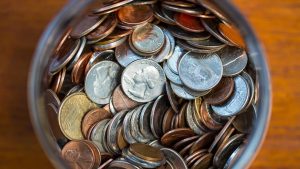
For decades, I kept a large cup in our bedroom into which I would empty coins from my pants pocket every evening. At the end of the year, my daughter and I would pour them onto a table, separate them by value, and put them in those paper rolls that always seemed a bit flimsy for the task. Then we’d total them up and donate that amount to whichever charity she preferred at the time. The sum usually amounted to $80-90, although it broke $100 once.
At some point, banks began frowning on accepting the rolls, so we’d go to a nearby store that had a Coinstar machine and dump them in there. But in the early years, Coinstar kept 9-11% as a fee for sorting and counting the coins. Then it added an option to get the full total (no fee) as a gift card for one of several businesses it had a deal with. That included Southwest Airlines, which I fly several times a year, so the funds didn’t go to waste. I would then write a check for the same amount to her chosen charity.
Doing it together as father and daughter made it a fun project, but since she hasn’t lived with us for several years, the tradition faded away. But that didn’t mean the coin cup began overflowing. Rather, it no longer gets nearly as full because I rarely pay cash for anything anymore and thus don’t get any change to drop in the cup later.
A few days ago, on a whim, my wife decided to dig into the coin cup, which we hadn’t emptied for at least two years — probably longer because of the pandemic. She poured the contents into a plastic bag and took it to our bank. The teller told her they couldn’t accept loose change because that branch doesn’t have a coin counting machine, but another one a few miles away does. So, Martha went there and had the coins converted into currency.
It came to a whopping fourteen bucks. Which she then spent on lunch. Because charity begins at home.
